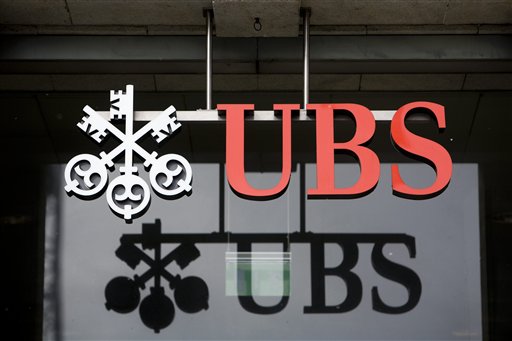Swiss bank UBS AG posted a fourth-quarter profit of 1.205 billion Swiss francs ($1.12 billion) Tuesday, beating analysts' expectations partly thanks to a tax credit, but said rich clients' withdrawals had continued.
Swiss bank UBS AG posted a fourth-quarter profit of 1.205 billion Swiss francs ($1.12 billion) Tuesday, beating analysts' expectations partly thanks to a tax credit, but said rich clients' withdrawals had continued.
The result is a significant swing from last year, when the bank reported a net loss of 9.58 billion francs in the fourth quarter. It also comes after three consecutive quarterly losses in 2009 and efforts to salvage the bank's reputation among customers leery of its ongoing struggle with bad investments and U.S. tax authorities.
"We have taken decisive action to transform UBS, and it is now a focused, efficient and resilient firm," Chief Executive Oswald Gruebel said in a statement. "We expect that our return to profitability will increase clients' confidence in UBS and restore our reputation."
On average, analysts had predicted that UBS would report a net profit of 321 million francs in the final quarter.
UBS beat those expectations by a wide margin, citing a revised U.S. tax estimate — for a gain of 480 million francs — and lower costs. The bank cut staff numbers by 16 percent last year to just over 65,000, helping to drop fixed costs by 20.2 billion francs.
Analysts at Zuercher Kantonalbank noted that reported results were also boosted by lower credit provisions and the reversal of set-asides for employee bonuses.
However, net new money — an important indicator of future business — remained negative during the fourth quarter. Outflows amounted to 56.2 billion francs, with more than half coming from its Wealth Management and Swiss Bank division. ZKB analysts described the figure as "massively disappointing" and twice as high as expected.
UBS said it was confident that measures taken to address the causes of client asset outflows will be effective, but still expects to report net withdrawals in the immediate future, noting that a recent tax amnesty in Italy alone led to net withdrawals of over 8 billion francs. Governments have been seeking ways to tap into the billions of francs in untaxed assets their citizens are believed to have stashed in Swiss banks.
The bank said it was confident that its other tax headache, a long-running dispute with U.S. authorities over allegations it helped Americans hide millions from the Internal Revenue Service, would be resolved.
A Swiss court ruling last month put on hold a carefully crafted agreement between the U.S. and Swiss governments to end a legal case against UBS in return for the handover of thousands of customer files to U.S. tax authorities.
"We are, as we have been, fulfilling our obligations under our part of the bargain," Chief Financial Officer John Cryan said, but added that UBS isn't taking direct part in the talks to save the U.S.-Swiss deal.
"I'm afraid we are playing unfortunately a rather passive role, which is never very comfortable, but it's the situation we're in," he said in a conference call.
Cryan played down the impact of the U.S. tax case on client confidence, insisting that customers were more interested in the bank's financial bottom line than in its legal tussles.
"Now that we are (profitable) the reasons for clients not to want to bring money back to the bank have gone away," he said.
All of the Zurich-based bank's four business units made a pretax profit during the quarter, including its closely watched investment bank, which recorded a profit of 297 million francs. The investment bank was responsible for the majority of UBS's massive losses during the credit crisis, leading some in Switzerland to call for it to be spun off or sold.
UBS said it expects the investment bank's performance to further improve in 2010.
The bank is proposing no dividend to its shareholders.







